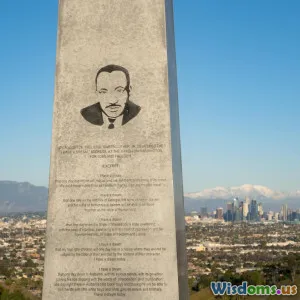
Examining the Lasting Influence of Martin Luther Kings Letters
7 min read Explore how Martin Luther King's letters continue to inspire social change and civil rights movements worldwide. (0 Reviews)
Examining the Lasting Influence of Martin Luther King's Letters
Introduction
Few figures in history have imparted wisdom as profoundly as Dr. Martin Luther King Jr., a civil rights leader whose words resonate decades beyond their time. Among his enduring legacies lie his letters—powerful texts that continue to inspire movements for equality, justice, and peace worldwide. What is it about these personal, reflective writings, such as the famed "Letter from Birmingham Jail," that still captivate and mobilize activists, scholars, and everyday people around the globe? This article examines the lasting influence of King's letters, exploring their historical context, enduring messages, and how they shape dialogue on civil rights today.
Historical Context: Letters as a Tool for Justice
The "Letter from Birmingham Jail"
Perhaps the most iconic of King's letters was penned in April 1963 during his imprisonment in Birmingham, Alabama. What began as a response to local clergymen condemning his protests turned into a deeply philosophical and strategic defense of nonviolent civil disobedience. King articulated a compelling argument for addressing injustice "directly and nonviolently," emphasizing that "injustice anywhere is a threat to justice everywhere."
This letter was groundbreaking—not only for its eloquence but because it managed to communicate complex ethical reasoning to a wide audience, challenging both the complacency of the white moderate and the broader societal structures supporting segregation. Educational institutions, civil rights organizations, and policymakers have frequently referenced it to underscore the urgency and morality of the movement.
Other Correspondences
In addition to the Birmingham letter, King's extensive correspondence, including letters to fellow activists, supporters, and even critics, reveal his strategic mind and profound empathy. His communication style blends moral urgency with hopeful pragmatism, illustrating a leader grounded in faith and unyielding commitment to justice.
Enduring Themes and Messages
The Moral Imperative of Justice
King’s letters continually reinforce that justice is not only a legal or political concept but a deeply moral necessity. In his words, the fight against oppression was tied to a universal ethical call to recognize the humanity and dignity of every individual. For example, he often referenced biblical narratives and philosophical principles to frame civil rights as not just a political struggle but a sacred duty.
This moral framing challenges readers beyond their immediate context—it offers a timeless blueprint for activism rooted in conscience and righteousness.
Nonviolent Resistance and Direct Action
King's letters articulate the strategy and necessity of direct action. Rather than accepting slow, incremental legal reforms, he advocated for planned, nonviolent protests designed to create tension that forces communities to confront uncomfortable realities. His reflections on this method have informed movements ranging from anti-apartheid activism in South Africa to recent Black Lives Matter protests in the United States.
The Power of Hope and Persistence
King’s correspondence also speaks volumes about resilience. In moments of doubt and hardship, his writings convey steadfast hope and an unwavering belief that justice would ultimately prevail. For instance, writing from jail, he expressed deep confidence that "the arc of the moral universe is long, but it bends toward justice," echoing a persistent optimism that inspires countless leaders today.
Real-World Impact and Contemporary Influence
Inspiring Social Movements Globally
The influence of King's letters reaches beyond U.S. borders. Activists in India, South Africa, and numerous other countries cite his writings as blueprints for movements against colonialism, apartheid, and systemic racism. For example, Nelson Mandela often acknowledged King's philosophy when fighting apartheid, demonstrating the international renown King's messages achieved.
Shaping Educational Curricula and Public Discourse
King’s letters form a cornerstone in education on civil rights and ethical leadership. High school and university syllabuses frequently include the "Letter from Birmingham Jail" as essential reading, fostering critical reflection on justice and social responsibility among new generations.
Moreover, public speeches by political and social leaders regularly draw from King's writings to reinforce calls for unity and equality, illustrating how his eloquence remains a rhetorical and moral resource.
Legal and Policy Implications
King’s letters have not only inspired activism but have indirectly influenced legislative conversations. His articulate defense of civil disobedience and the moral urgency to end segregation infused the legal atmosphere leading to landmark legislation like the Civil Rights Act of 1964 and Voting Rights Act of 1965.
Conclusion
Martin Luther King Jr.'s letters are far more than historical documents; they are living texts that continue to educate, motivate, and shape justice movements around the world. Their blend of moral clarity, strategic insight, and hopeful conviction establishes them as a timeless foundation for activism and ethical leadership.
By delving deeply into the context, themes, and ongoing influence of King's letters, readers gain not only historical understanding but also empowerment to engage with contemporary struggles for equality and human rights. As we reread King's words today, the challenge remains: to embody the courage, patience, and resolve they inspire in pursuit of a more just world.
“Injustice anywhere is a threat to justice everywhere.” — Martin Luther King Jr., Letter from Birmingham Jail
Rate the Post
User Reviews
Other posts in Political Philosophy
Popular Posts














